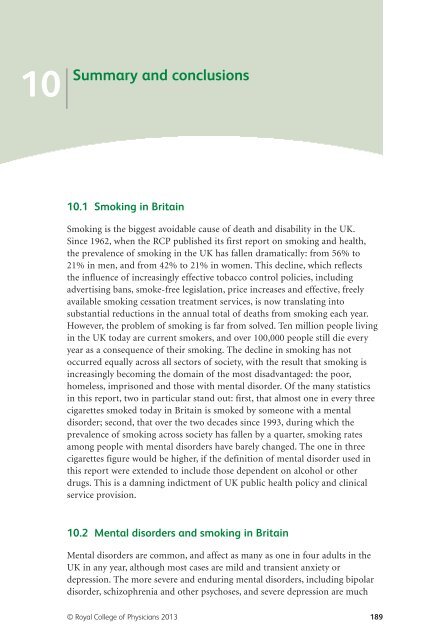Smoking and mental health - NCSCT
Smoking and mental health - NCSCT
Smoking and mental health - NCSCT
You also want an ePaper? Increase the reach of your titles
YUMPU automatically turns print PDFs into web optimized ePapers that Google loves.
10<br />
Summary <strong>and</strong> conclusions<br />
10.1 <strong>Smoking</strong> in Britain<br />
<strong>Smoking</strong> is the biggest avoidable cause of death <strong>and</strong> disability in the UK.<br />
Since 1962, when the RCP published its first report on smoking <strong>and</strong> <strong>health</strong>,<br />
the prevalence of smoking in the UK has fallen dramatically: from 56% to<br />
21% in men, <strong>and</strong> from 42% to 21% in women. This decline, which reflects<br />
the influence of increasingly effective tobacco control policies, including<br />
advertising bans, smoke-free legislation, price increases <strong>and</strong> effective, freely<br />
available smoking cessation treatment services, is now translating into<br />
substantial reductions in the annual total of deaths from smoking each year.<br />
However, the problem of smoking is far from solved. Ten million people living<br />
in the UK today are current smokers, <strong>and</strong> over 100,000 people still die every<br />
year as a consequence of their smoking. The decline in smoking has not<br />
occurred equally across all sectors of society, with the result that smoking is<br />
increasingly becoming the domain of the most disadvantaged: the poor,<br />
homeless, imprisoned <strong>and</strong> those with <strong>mental</strong> disorder. Of the many statistics<br />
in this report, two in particular st<strong>and</strong> out: first, that almost one in every three<br />
cigarettes smoked today in Britain is smoked by someone with a <strong>mental</strong><br />
disorder; second, that over the two decades since 1993, during which the<br />
prevalence of smoking across society has fallen by a quarter, smoking rates<br />
among people with <strong>mental</strong> disorders have barely changed. The one in three<br />
cigarettes figure would be higher, if the definition of <strong>mental</strong> disorder used in<br />
this report were extended to include those dependent on alcohol or other<br />
drugs. This is a damning indictment of UK public <strong>health</strong> policy <strong>and</strong> clinical<br />
service provision.<br />
10.2 Mental disorders <strong>and</strong> smoking in Britain<br />
Mental disorders are common, <strong>and</strong> affect as many as one in four adults in the<br />
UK in any year, although most cases are mild <strong>and</strong> transient anxiety or<br />
depression. The more severe <strong>and</strong> enduring <strong>mental</strong> disorders, including bipolar<br />
disorder, schizophrenia <strong>and</strong> other psychoses, <strong>and</strong> severe depression are much<br />
© Royal College of Physicians 2013 189














